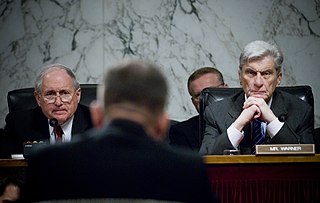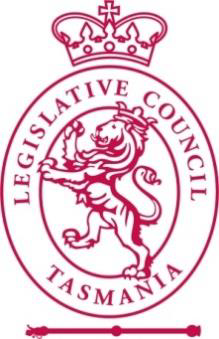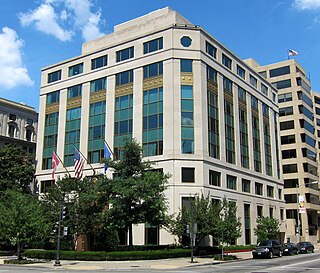Related Research Articles

The U.S. Senate Committee on Small Business and Entrepreneurship is a standing committee of the United States Senate. It has jurisdiction over the Small Business Administration and is also charged with researching and investigating all problems of American small business enterprises.

A congressional committee is a legislative sub-organization in the United States Congress that handles a specific duty. Committee membership enables members to develop specialized knowledge of the matters under their jurisdiction. As "little legislatures", the committees monitor ongoing governmental operations, identify issues suitable for legislative review, gather and evaluate information, and recommend courses of action to their parent body. Woodrow Wilson once wrote, "it is not far from the truth to say that Congress in session is Congress on public exhibition, whilst Congress in its committee rooms is Congress at work." It is not expected that a member of Congress be an expert on all matters and subject areas that come before Congress. Congressional committees provide valuable informational services to Congress by investigating and reporting about specialized subjects.

The Tasmanian Legislative Council is the upper house of the Parliament of Tasmania in Australia. It is one of the two chambers of the Parliament, the other being the House of Assembly. Both houses sit in Parliament House in the state capital, Hobart. Members of the Legislative Council are often referred to as MLCs.

The United States Senate Committee on the Judiciary, informally known as the Senate Judiciary Committee, is a standing committee of 21 U.S. senators whose role is to oversee the Department of Justice (DOJ), consider executive and judicial nominations, and review pending legislation.

The United States Senate Committee on Finance is a standing committee of the United States Senate. The Committee concerns itself with matters relating to taxation and other revenue measures generally, and those relating to the insular possessions; bonded debt of the United States; customs, collection districts, and ports of entry and delivery; deposit of public moneys; general revenue sharing; health programs under the Social Security Act and health programs financed by a specific tax or trust fund; national social security; reciprocal trade agreements; tariff and import quotas, and related matters thereto; and the transportation of dutiable goods. It is considered to be one of the most powerful committees in Congress.

The United States Senate Committee on Health, Education, Labor and Pensions (HELP) generally considers matters relating to these issues. Its jurisdiction also extends beyond these issues to include several more specific areas, as defined by Senate rules.

The Senate Committee on Rules and Administration, also called the Senate Rules and Administration Committee, is responsible for the rules of the United States Senate, administration of congressional buildings, and with credentials and qualifications of members of the Senate, including responsibility for contested elections. The committee is not as powerful as its House counterpart, the House Committee on Rules, as it does not set the terms of debate for individual legislative proposals, since the Senate has a tradition of open debate. Some members of the committee are also ex officio members of the Joint Committee on the Library and the Joint Committee on Printing.

The Architect of the Capitol is the federal agency responsible for the maintenance, operation, development, and preservation of the United States Capitol Complex. It is an agency of the legislative branch of the federal government and is accountable to the United States Congress and the Supreme Court. Both the agency and the head of the agency are called "Architect of the Capitol". The head of the agency is appointed by a vote of a congressional commission for a ten-year term. Prior to 2024, the president of the United States appointed the Architect upon confirmation vote by the United States Senate, and was accountable to the president.

The Federal Protective Service (FPS) is a federal law enforcement agency of the United States Department of Homeland Security (DHS). It is also "the federal agency charged with protecting and delivering integrated law enforcement and security services to facilities owned or leased by the General Services Administration (GSA)"—over 9,000 buildings—and their occupants.

Subdivisions are land that is divided into pieces that are easier to sell or otherwise develop, usually via a plat. The former single piece as a whole is then known as a subdivision. Subdivisions may be simple, involving only a single seller and buyer, or complex, involving large tracts of land divided into many smaller parcels. If it is used for housing it is typically known as a housing subdivision or housing development, although some developers tend to call these areas communities.

The Civil Rights Act of 1960 is a United States federal law that established federal inspection of local voter registration polls and introduced penalties for anyone who obstructed someone's attempt to register to vote. It dealt primarily with discriminatory laws and practices in the segregated South, by which African Americans and Mexican-American Texans had been effectively disenfranchised since the late 19th and start of the 20th century. This was the fifth Civil Rights Act to be enacted in United States history. Over an 85-year period, it was preceded only by the Civil Rights Act of 1957, whose shortcomings largely influenced its creation. This law served to more effectively enforce what was set forth in the 1957 act through eliminating certain loopholes in it, and to establish additional provisions. Aside from addressing voting rights, the Civil Rights Act of 1960 also imposed criminal penalties for obstruction of court orders to limit resistance to the Supreme Court's school desegregation decisions, arranged for free education for military members' children, and banned the act of fleeing to avoid prosecution for property damage. The Civil Rights Act of 1960 was signed into law by President Dwight D. Eisenhower.

The Committee on Energy and Commerce is one of the oldest standing committees of the United States House of Representatives. Established in 1795, it has operated continuously—with various name changes and jurisdictional changes—for more than 200 years. The two other House standing committees with such continuous operation are the House Ways and Means Committee and the House Rules Committee. The committee has served as the principal guide for the House in matters relating to the promotion of commerce and to the public's health and marketplace interests, with the relatively recent addition of energy considerations among them. Due to its broad jurisdiction, it is considered one of the most powerful committees in the House.

The United States House Committee on House Administration deals with the general administration matters of the United States House of Representatives, the security of the United States Capitol, and federal elections.

The Laborers' International Union of North America, often shortened to just the Laborers' Union, is an American and Canadian labor union formed in 1903. As of 2017, they had about 500,000 members, about 80,000 of whom are in Canada. The current general president is Brent Booker who was appointed general president in 2023. There are nine regions across North America; these regions are further divided into 500 local unions. One region is in Toronto, Canada, and is led by Joseph Mancinelli, Local 183, which is the largest construction local union in North America.
Congressional oversight is oversight by the United States Congress over the executive branch, including the numerous U.S. federal agencies. Congressional oversight includes the review, monitoring, and supervision of federal agencies, programs, activities, and policy implementation. Congress exercises this power largely through its congressional committee system. Oversight also occurs in a wide variety of congressional activities and contexts. These include authorization, appropriations, investigative, and legislative hearings by standing committees; which is specialized investigations by select committees; and reviews and studies by congressional support agencies and staff.

The U.S. Commission of Fine Arts (CFA) is an independent agency of the federal government of the United States, and was established in 1910. The CFA has review authority over the "design and aesthetics" of all construction within Washington, D.C. In accordance with the Old Georgetown Act, the CFA appoints the Old Georgetown Board. The Old Georgetown Board has design review authority over all semipublic and private structures within the boundaries of the Georgetown Historic District. The CFA was granted approval authority by the Shipstead-Luce Act over the design and height of public and private buildings which front or abut the grounds of the United States Capitol, the grounds of the White House, Pennsylvania Avenue NW extending from the Capitol to the White House, Lafayette Square, Rock Creek Park, the National Zoological Park, the Rock Creek and Potomac Parkway, Potomac Park, and the National Mall and its constituent parks.

Scottish Parliament committees are small groups of Members of the Scottish Parliament (MSPs) who meet on a regular basis to scrutinise the work of the Scottish Government, conduct inquiries into subjects within their remit and examine legislation. Much of the everyday work of the Scottish Parliament is done by these committees.
The United States House Committee on Territories was a committee of the United States House of Representatives from 1825 to 1946. Its jurisdiction was reporting on a variety of topics related to the territories, including legislation concerning them, and their admission as new states.

The Federal-Aid Highway Act of 1968 is legislation enacted by the United States Congress and signed into law on August 24, 1968, which expanded the Interstate Highway System by 1,500 miles (2,400 km); provided funding for new interstate, primary, and secondary roads in the United States; explicitly applied the environmental protections of the Department of Transportation Act of 1966 to federal highway projects; and applied the Davis–Bacon Act to all highway construction funded by the federal government. It established three new programs: a National Bridge Inspection Program, funding and fair housing standards for those displaced by federally funded highway construction, and a traffic operations study program.
References
- 1 2 3 4 "Guide to House Records: Chapter 17: Records of the Public Works Committees". U.S. National Archives and Records Administration. 2017-07-20. Retrieved 2024-07-23.
 This article incorporates text from this source, which is in the public domain .
This article incorporates text from this source, which is in the public domain .
This article has not been added to any content categories . Please help out by adding categories to it so that it can be listed with similar articles. (August 2024) |